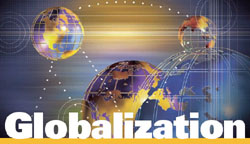08.16.2006 14:32
 By Anthony Brenton
By Anthony Brenton
Last month’s successful G8 summit in St. Petersburg — which approved a record number of statements and communiques — confirmed that our shared interests, the challenges we face, and the solutions that are needed are all genuinely global in nature. But globalization does not, of course, happen just once a year. And it does not just happen from above, at the level of political leaders. It is a continuous and rapidly developing set of processes bringing economies and societies ever closer together.
Russia’s recent experience strikingly confirms this. Its participation in globalization is deepening at an impressive rate. Here are five examples.
First, Russia has made enormous progress towards WTO membership. With renewed effort in the autumn, there is every hope that it will join this global trading regime soon. Second, Russian companies are increasingly borrowing on international capital markets. Foreign indebtedness rose by $68 billion last year, and nearly $5 billion in IPOs were successfully issued in London — with more to come this year. Third, foreign direct investment this year has already exceeded last year’s total, bringing new capital, management expertise and technology. Fourth, Russian companies are actively investing abroad. For example, British car producers and football teams, among other companies, have acquired Russian owners. Finally, Russia’s role as an energy supplier to major international markets is set to grow significantly.
There is every reason to believe these trends will intensify. This is not just striking in its own terms, but unprecedented in Russia’s history. During the Cold War, the Soviet Union ran a largely autarchic, centrally planned economic bloc with only limited economic ties with the outside world (mainly oil exports, grain imports and aid to allies). It is true that in tsarist times Russia played an important international economic role. In the years leading up to World War I, it became a major agricultural exporter and attracted large loans and direct investment that supported its industrialization. But even this was limited. Historically, Russia’s international economic position has been mostly one of relative weakness. Now, for the first time, it is one of growing strength and self-confidence.
This is a highly positive development for Russia. The record since 1945 clearly shows that the most effective engine of sustained growth is domestic reform plus international integration. The more recent experience of emerging markets, notably China and India, confirms this. Developed economies continue to benefit too. The U.K. attracts more foreign direct investment than any other country except the United States. This openness, together with flexible market institutions, has contributed to Britain’s success as one of the best-performing Western European economies in the past decade.
It is not yet clear how Russia intends to manage its growing involvement in the international economic and financial system. There is a debate to be had on the issue. Some may fear globalization. They may worry that particular sectors of the economy will be hurt. It is true that globalization sometimes creates temporary dislocations. Some other G8 countries have experienced this. But the point is not to respond by restricting integration into the international economy but rather to conduct a flexible and responsive domestic policy that harnesses the long-term benefits while managing and minimizing any short-term difficulties.
But sometimes the impression is created that there are some in Russia who may seek to limit Russia’s involvement in globalization for a different reason. Some, it seems, may wish to use Russia’s deepening economic relations not only as a source of welfare, but as a means of exerting broader influence on other countries.
Such a view would be misguided. Globalization means mutual interdependence, not the dependence of some countries on others. Russia needs growing foreign investment, as well as access to markets, in order to modernize its economy. And in today’s dynamic and rapidly evolving markets, any attempt to manipulate economic relations for noneconomic ends is bound to fail. Worse, it would be self-defeating. Russian citizens and companies would lose out on the enormous benefits of global economic integration. The country as a whole would risk losing ground to other major emerging markets.
In St. Petersburg, the G8 countries committed themselves to, among other key principles, “open, transparent, efficient and competitive markets for energy production, supply, use, transmission and transit services.” They recognized that such a market-based approach offers the most effective, flexible and mutually beneficial way of organizing relations in the energy sphere. It is in all our interests that the G8 exercise global leadership by implementing these agreed principles.
Russia’s route forward is clear. In a globalizing world it makes no sense to limit one’s involvement in the international economy for protectionist or political reasons. The only path that promises success is to embrace globalization and become an integral part of the engine of global growth. It may not always be easy, but it is the only way to support high-quality, long-term growth and unleash the innovative talents and energies of Russian entrepreneurs on an international scale. Globalization is an enormously powerful driver of growth. It is a challenge to be met, not a threat to be avoided — and least of all a weapon to be honed.
Anthony Brenton is British ambassador to Russia.
News source: times.spb.ru
 Print this news Print this news
Business news archive for 16 August' 2006.
Business news archive for August' 2006.
Business news archive for 2006 year.
|